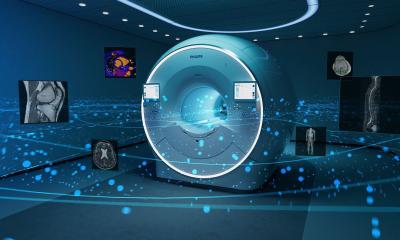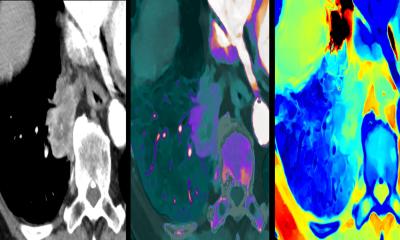PET/MR receives CE Mark
Royal Philips Electronics is announcing CE marking for the industry’s first commercially available whole body PET/MR imaging system, the Ingenuity TF PET/MR*. This new system, being launched as the first new Philips modality in ten years, integrates the molecular imaging capabilities of PET with the superior soft tissue contrast of MR to image disease cells as they proliferate in soft tissue. Since the Ingenuity TF PET and MR scanners are placed only three meters apart and the patient table rotates to allow the patient to be scanned by each modality, the system can also acquire separate PET and MR images.

Clinicians anticipate using the Ingenuity TF PET/MR to screen patients at high-risk for heart disease to ultimately treat diseased cells prior to the formation of dangerous coronary plaques. The system may also be used to scan patients to detect tumor formation/recurrence. Since the Ingenuity TF PET/MR provides the best of Astonish TF PET and 3T MR, it is also possible to track whether a drug is reaching a tumor or plaque and monitor efficacy on a potential cellular level. In addition to greater visualization of disease process, the system can also produce up to 70% less ionizing radiation than PET/CT. i, ii
The Future of Personalized Medicine
The combination of advances in high resolution MR and the ability to combine MR and PET into one whole body system has lead healthcare professionals to believe that the Ingenuity TF PET/MR will help identify disease sooner and make personalized medicine a reality.
“It’s rare to develop a modality that completely revolutionizes imaging; usually, companies can only strive for clearer images at a lower dose. With the Ingenuity TF PET/MR, researchers are experiencing breakthroughs on multiple fronts. They are able to effectively image the prostate for the first time and detect deadly cancers in organs such as the pancreas at a significantly earlier stage,” said Dominic Smith, vice president of marketing, Computed Tomography and Nuclear Medicine for Philips Healthcare. “The Ingenuity TF PET/MR provides researchers and clinicians an unprecedented opportunity to make earlier diagnoses and personalize treatments for oncology and cardiology.”
University of Geneva
The University Hospital of Geneva houses Europe’s first combined whole body PET/MR system. Professor Osman Ratib, chief of Nuclear Medicine, University of Geneva, commented, “Our validation tests show that bringing the two modalities together improves the quality and accuracy of diagnoses. The molecular imaging provided by PET in conjunction with the anatomy and tissue characterization of MR has enabled us to see the function and metabolism of tissue more precisely than ever before. The clinical cases have already shown the advantages of being able to perfectly superimpose PET over MR images to detect lesions in various organs. Previously, this was not possible because the two studies took place at different times, with different conditions and with different patient positions. We are confident that PET/MR will become a valuable asset in our department and we look forward to being able to use it in our clinical routine.”
Professor Zahi Fayad, Professor of Radiology and Medicine (Cardiology), and director, Translational and Molecular Imaging Institute, Mount Sinai School of Medicine in New York, New York and Prof. Joerg Steinbach, Director, Institute of Radiopharmacy, Helmholtz-Zentrum Dresden-Rossendorf (HZDR), Dresden, Germany also installed the Ingenuity TF PET/MR. In 2011, additional installations are expected worldwide.
*Pending 510(k), not available for sale in the U.S.
25.01.2011





